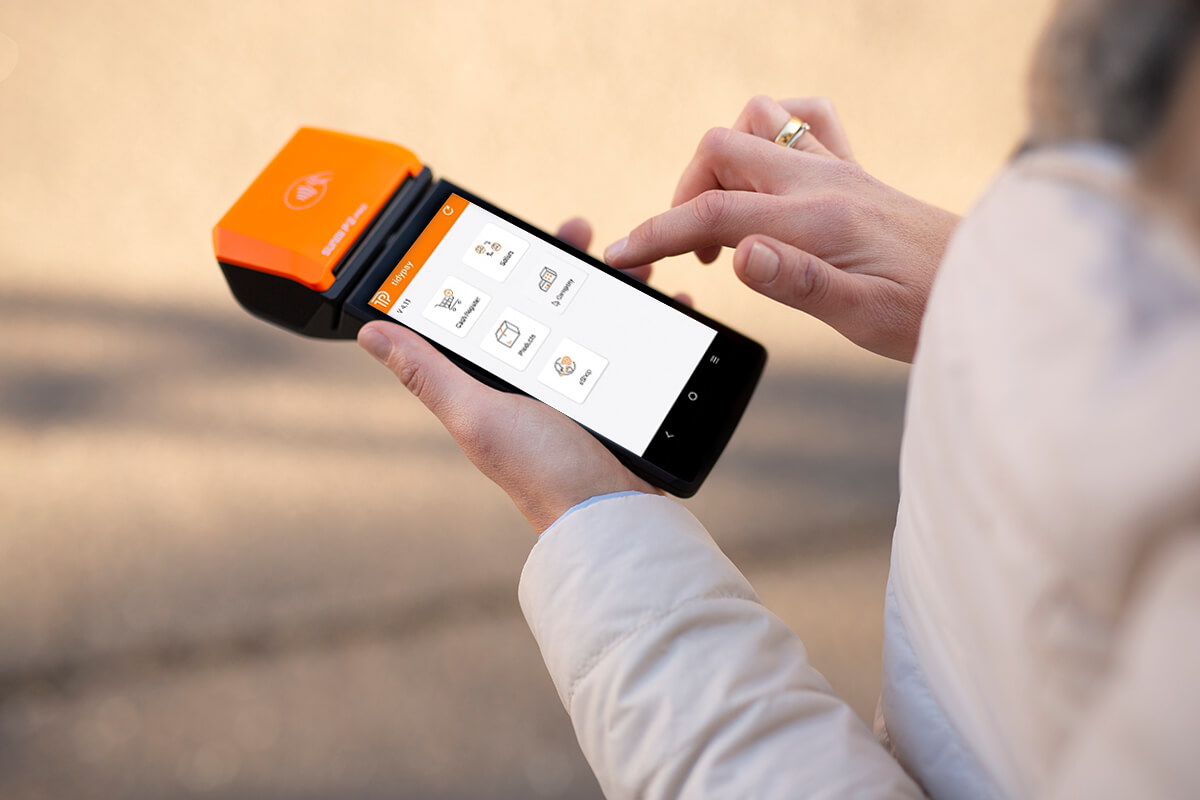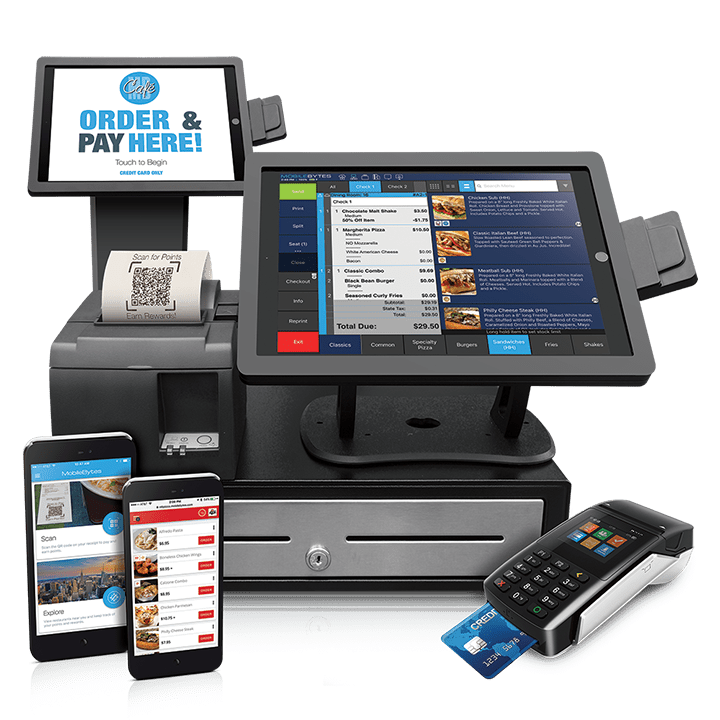4 Easy Facts About Point Of Sale Described
4 Easy Facts About Point Of Sale Described
Blog Article
The Ultimate Guide To Point Of Sale

Point of Sale Systems: Retail Point-Of-Sale Solutions Streamline Deals
Little Known Facts About Pos.

Hardware Parts of a Point of Sale System What makes a POS system tick? It's not simply software; the hardware plays a starring role. Consider it as the body to the software application's brain. Without the right hardware, even the most sophisticated POS software application is simply a pretty face. Essential POS Hardware So, what are the check here must-haves? Let's break it down. The main processing system, frequently a computer or tablet, is the heart of the operation. The screen or touchscreen show enables personnel to connect with the system. A barcode scanner accelerate the checkout process. Remember the days of by hand getting in each code? The trusty invoice printer provides clients with a record of their purchase. A cash drawer keeps your money safe and arranged. A card reader enables customers to pay with credit or debit cards. Diving Deeper: Beyond the Fundamentals However wait, there's more! Depending upon your business, you might need specific hardware. For example, a dining establishment might integrate cooking area printers to relay orders, while a retail store may use label printers for item tagging. Ever question how your regional bakery instantly prints those delicious-looking labels? Selecting the Right Hardware: A Balancing Act Picking the ideal hardware isn't practically purchasing the most expensive devices. It's about discovering the sweet spot between performance, resilience, and budget plan. A small company just beginning might choose a more standard setup, while a high-volume retailer will need robust, high-performance devices. Is it much better to buy brand-new or utilized? Consider your choices carefully. A new system provides the current technology and service warranty protection, however a reconditioned system can conserve you money. The Future of POS Hardware What does the future hold? Anticipate to see much more combination with mobile phones, biometric scanners for staff member authentication, and advanced analytics dashboards displayed on bigger, clearer screens. Picture a world where stock is automatically upgraded in real-time as products are scanned-- a world where you can track your best-selling item from anywhere in the world. The possibilities are limitless, and the hardware is continuously evolving to satisfy the demands these days's services. Are you all set to upgrade your point of sale system?
Software Application Features and Capabilities: The Heart of Your POS System
Ever enjoy a skilled barista move through a busy early morning rush? Their trick isn't simply caffeine; it's a smooth dance with their POS system. The software application is the conductor of your company symphony, managing whatever from sales to stock. However what notes should you be listening for? What capabilities really matter in today's market?
Inventory Management: Beyond Counting Beans
Forget spreadsheets that haunt your dreams. Modern POS systems use real-time inventory tracking, signaling you when your stock of artisanal coffee beans dips precariously low. Think about it as a digital guardian angel, avoiding those awkward "Sorry, we're out!" minutes to consumers. What if you could also anticipate demand based upon historic data? Lots of systems now provide forecasting tools, a powerful weapon versus overstocking and lost sales. This assists prevent the predicament of running out of popular products or accumulating excess inventory of slow-moving products, both of which can constrain capital and space.
Sales Reporting and Analytics: Deciphering the Data
Sales information is the brand-new gold, and your POS system is the miner. Forget feeling in one's bones just how much you offered today. Dive deep into the information to reveal trends, determine your very popular products, and comprehend consumer habits. Which menu item sets perfectly with the daily special? Which promotion resonated most with your clients? These insights are not just interesting; they're actionable intelligence. Without dependable sales reporting, navigating the intricacies of business decision-making ends up being like sailing without a compass, increasing the chance of bad moves and missed chances.
Consumer Relationship Management (CRM): Building Bridges, Not Walls
Remembering a regular consumer's name and favorite order is charming, however scaling that personal touch is tricky. POS systems with CRM abilities permit you to track customer purchase history, choices, and even birthdays. Think of automatically offering a discount on their birthday-- a little gesture that promotes loyalty and encourages repeat business. However there is the potential snag of poor data quality, which can cause inaccurate consumer profiles and inadequate marketing efforts.
Payment Processing: Enhancing the Deal
The checkout experience can make or break a sale. Seamless combination with numerous payment approaches-- charge card, mobile wallets, even copyright-- is non-negotiable. Can your system manage split payments? Does it offer safe and secure tokenization to safeguard customer data? A cumbersome payment procedure is like hitting a sour note in your service symphony, potentially disrupting the entire efficiency. Making sure compatibility with evolving payment technologies and adherence to security requirements are vital for maintaining client trust and operational effectiveness.
Staff Member Management: Keeping the Group in Sync
From clocking in and out to handling authorizations and tracking efficiency, staff member management features simplify operations and enhance responsibility. Is scheduling a problem? Many POS systems provide incorporated scheduling tools, optimizing staffing levels based on predicted demand. A common challenge that is often neglected is the obstacle of integrating worker management performances with payroll systems, which can cause errors and inadequacies in wage calculations.
Advanced Features: Leveling Up Your Operations
- Table Management: Perfect for dining establishments, this function permits you to visualize your dining-room, track table status, and manage reservations.
- Loyalty Programs: Reward your finest customers and motivate repeat company with integrated commitment programs.
- Online Ordering Combination: Perfectly incorporate your POS system with online purchasing platforms to broaden your reach.
Selecting the best POS system has to do with more than simply functionality; it's about discovering a partner that can grow with your company. Consider your existing needs, prepare for future development, and don't hesitate to ask the difficult concerns. The best software application can transform your service from a chaotic cacophony into a harmonious work of art.
Industry-Specific POS System Applications
Think about the local bakery, bustling with morning customers yearning fresh croissants. A generic POS system might handle transactions, but can it manage intricate recipes, track component stock, or immediately adjust production schedules based on sales information? Probably not. That is where the appeal of industry-specific POS systems shines.
Restaurants and Hospitality
For busy dining establishments, speed and precision are critical. The number of times have you seen servers managing orders, modifications, and splitting bills, all while trying to provide outstanding service? A dining establishment POS system simplifies these procedures, enabling for table management, cooking area order tickets, and even online purchasing combination. These systems typically consist of functions like ingredient-level inventory tracking, vital for handling food costs and decreasing waste. Ever wonder why your preferred meal is sometimes unavailable? It might come from a lack of correct inventory management.
- Table Management
- Cooking Area Order Tickets
- Online Purchasing Combination
- Ingredient-Level Stock Tracking
Retail Solutions
Retail, with its diverse stock and client interactions, demands a different set of tools. Think of a shop clothes shop having a hard time to keep track of sizes, colors, and seasonal collections utilizing a fundamental checkout system. An industry-specific retail POS system uses features like barcode scanning, consumer loyalty programs, and in-depth sales reporting. These systems can even incorporate with e-commerce platforms, offering a smooth omnichannel experience for clients. Did you know some retail POS systems can anticipate future sales trends based upon historic information? Now that is effective!
The Hazards of a Mismatch
Selecting the wrong POS system can produce considerable operational hurdles. A clothing shop using a dining establishment POS, for instance, would find it inappropriate for managing inventory with sizes and colors. The lack of appropriate reporting and analytics might lead to misinformed buying choices and lost income. The result might be similar to trying to fit a square peg in a round hole.
Key Factors to consider
Choosing an industry-specific POS system needs careful evaluation. Believe about your service's unique requirements and operational workflows. Does the system incorporate with existing software application? Does it offer the required reporting abilities? Is it scalable to accommodate future growth? A well-chosen POS system is not simply a transaction tool; it's a tactical possession that can drive efficiency, enhance customer complete satisfaction, and ultimately, improve your bottom line. Remember, it is an investment in your business's future, not simply an expense.
Security Factors To Consider for Point of Sale Systems
Ever heard the tale of the mom-and-pop shop that lost whatever since of a single, neglected security flaw in their POS system!.?. !? It's a cautionary tale, and it highlights a vital aspect frequently eclipsed by the allure of expensive features and structured operations. The truth is, a POS system is just as good as its security. What good is a system that crunches numbers in a flash if it permits wrongdoers to swipe client's data simply as quickly?
The Vulnerability Minefield
The digital landscape is a battlefield. Every POS system, despite size or elegance, is a prospective target. Are you genuinely prepared for the hazards hiding around the corner? The real pinch comes when you find that your out-of-date software application has a gaping hole that hackers can make use of, turning your service into an unwitting accomplice in identity theft. The trouble is that hackers are crafty and are always altering their methods.
Common Security Gaps and Professional Tips
- Weak Passwords: "Password123" isn't sufficing. Use strong, special passwords for all POS system accounts and change them regularly. Two-factor authentication is a must.
- Unsecured Networks: Your Wi-Fi resembles leaving the front door open. Secure your network with strong encryption (WPA3 if possible) and consider a separate network for your POS system.
- Out-of-date Software Application: Software suppliers spot security holes all the time. Stopping working to upgrade resembles inviting trouble. Establish automatic updates or schedule routine upkeep.
- Worker Training: Your personnel is your first line of defense. Train them to acknowledge phishing efforts, secure passwords, and report suspicious activity.
Information Encryption: Your Shield Versus the Dark Arts
Think of information file encryption as a secret code. It scrambles sensitive details, like credit card numbers, making it unreadable to unapproved users. Without encryption, your clients' monetary information are like sitting ducks, ripe for the picking by cybercriminals. It's not practically protecting your clients; it's about securing your reputation and avoiding large fines.
PCI Compliance: The Rulebook You Can't Ignore
If you accept charge card, you're bound by the Payment Card Market Data Security Requirement (PCI DSS) It's a set of security standards developed to safeguard cardholder data. Stopping working to comply can result in fines, charges, and even the loss of your ability to process credit card payments. It's a headache, yes, but it's a needed one. Think about PCI compliance as the expense of doing service in the digital age.
Consider this: every transaction processed through your point of sale is a possible entry point for harmful actors. By executing robust security procedures, you're not just protecting your company; you're securing your consumers' trust and ensuring the long-lasting practicality of your operations. The security of your POS system isn't just a technical problem; it's an organization crucial. It requires continuous watchfulness, proactive procedures, and a dedication to remaining ahead of the curve.